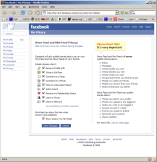 Earlier this week, facebook.com (the MySpace of college students) launched what it called "two cool features," feeds to track friends' online activities:
Earlier this week, facebook.com (the MySpace of college students) launched what it called "two cool features," feeds to track friends' online activities:
News Feed highlights what's happening in your social circles on Facebook. It updates a personalized list of news stories throughout the day, so you'll know when Mark adds Britney Spears to his Favorites or when your crush is single again. Now, whenever you log in, you'll get the latest headlines generated by the activity of your friends and social groups.
To management's apparent surprise, not all users thought these feeds were so cool. Protests were launched, using the feeds to spread their outrage, and users threatened boycotts.
Even though all the information available in "feeds" was information users were already making available to the same set of "friends," feeds felt different. Their tracking of changes from minute to minute, and instantaneous, aggregregate notification must have driven home to users just how much information Facebook had. Now, Facebook has added privacy settings to the feeds, and much of the furor seems already to be dissipating.
It's hard to tell whether this is a victory for "privacy" or not, but we can learn a few lessons from the sequence of events:
This means that when we're trying to give people privacy options in software, it might not be enough just to set a default and let them root around in configuration menus, or even to offer a checkbox. Instead, we should try to offer scenarios to taking people through the consequences of what checking the box means.
Privacy is multifaceted. As a society, we'll need to make social, legal, and technical choices to preserve the privacy that lets us have relationships and communities.